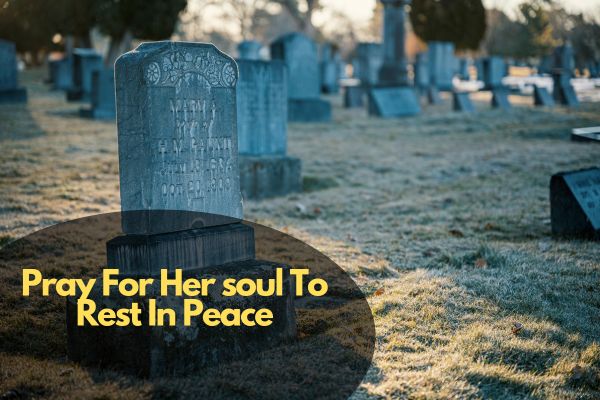Prayers have long been considered an effective means to provide comfort, consolation, and memory.
When a loved one passes away, it is a customary tradition to pray for their soul to rest in peace, which crosses cultural and theological barriers.
In this article, we will look at the meaning of prayers for the deceased and how they may provide comfort and healing during times of sadness.
Contents
Pray For Her Soul To Rest In Peace
Eternal rest grant unto her, O Lord, and let perpetual light shine upon her. May her soul and the souls of all the faithful departed, through the mercy of God, rest in peace.
Losing someone we care about is a deeply emotional experience that can leave us feeling lost, overwhelmed, and in need of solace. Throughout history, prayers have played a crucial role in offering support to the bereaved and helping them navigate the difficult journey of grief. Regardless of cultural or religious background, prayer serves as a way to connect with something greater than ourselves and find peace amidst the pain.
Understanding Grief and Loss
Grief is a natural response to loss, encompassing a range of emotions such as sadness, anger, confusion, and longing. It is a deeply personal experience that affects individuals in different ways. When someone passes away, those left behind often find themselves grappling with a mix of emotions as they try to come to terms with their loss.
The Significance of Prayer
Prayer holds immense significance when it comes to grieving and honouring the departed. It serves as a way to express our emotions, seek solace, and find strength during challenging times. In many religious and spiritual traditions, prayers for the deceased are believed to offer comfort not only to the departed soul but also to those who mourn their loss.
Cultural and Religious Practices
Different cultures and religions have unique practices and rituals associated with praying for the departed. For example, in some Christian traditions, prayers are offered during funeral services and memorial ceremonies. In Islam, the Janazah prayer is performed for the deceased, seeking forgiveness and mercy for the departed soul. Similarly, Hinduism, Buddhism, Judaism, and other faiths have their own customs and prayers dedicated to honouring and remembering those who have passed away.
Prayers for Healing and Closure
Prayers can play a vital role in the healing process after the loss of a loved one. They provide an avenue for expressing emotions, finding solace, and seeking closure. Many individuals find comfort in reciting prayers or engaging in meditative practices that help them connect with their departed loved ones on a spiritual level.
The Power of Collective Prayer
Collective prayer and group support have a unique ability to ease the burden of grief. When a community comes together to pray for the departed, it creates a collective energy that can uplift and console those who are mourning. The power of collective prayer lies in its ability to foster a sense of unity and shared healing.
Honouring and Remembering the Departed
Prayers are a way to honour and remember the departed, keeping their memory alive in our hearts. Beyond traditional funeral rituals, individuals can create their own rituals for remembrance. This may include visiting the grave, lighting candles, or dedicating a specific time for prayer and reflection.
Finding Comfort in Prayer
Countless individuals have found solace and comfort through prayer during times of grief. The act of praying can provide a sense of peace, reassurance, and connection to something greater than ourselves. It allows us to express our deepest emotions and concerns, knowing that our words are heard and understood. Through prayer, we can find a source of strength and guidance that helps us navigate the challenging journey of grief.
Coping with Loss
Coping with the loss of a loved one is an ongoing process that requires time, patience, and self-care. Prayer can be a valuable tool in this journey, providing a sense of purpose and comfort. Alongside prayer, it is essential to seek support from friends, family, or professional counsellors who can offer guidance and understanding during this difficult time.
Conclusion
Praying for the soul of a departed loved one to rest in peace is a universal practice that transcends cultural and religious boundaries. It is a way to offer comfort, solace, and remembrance to those who have passed away.
Prayer provides a channel for expressing our emotions, seeking healing, and finding strength during times of grief. By embracing prayer as a part of the grieving process, we can find comfort, peace, and a renewed sense of hope.








